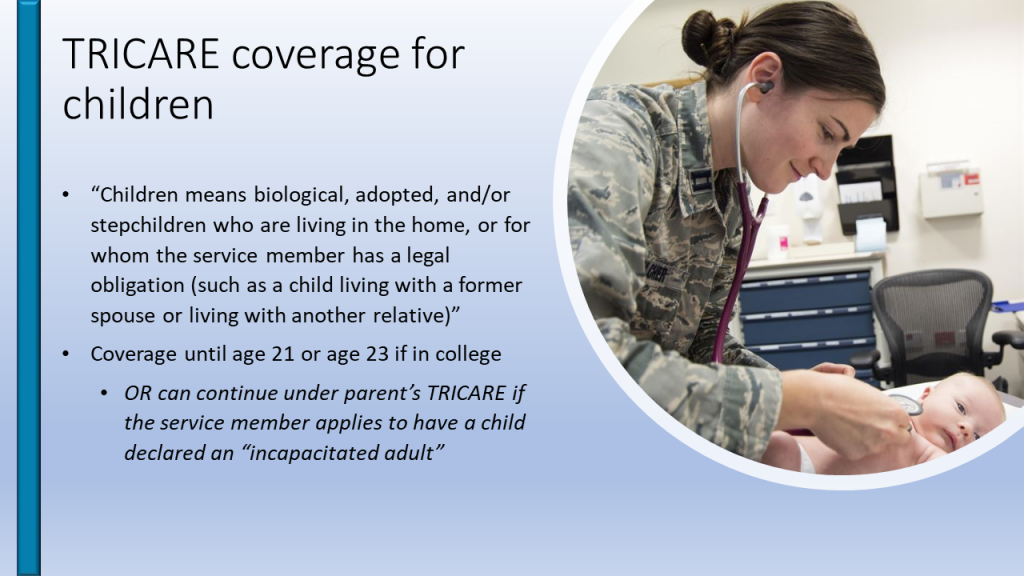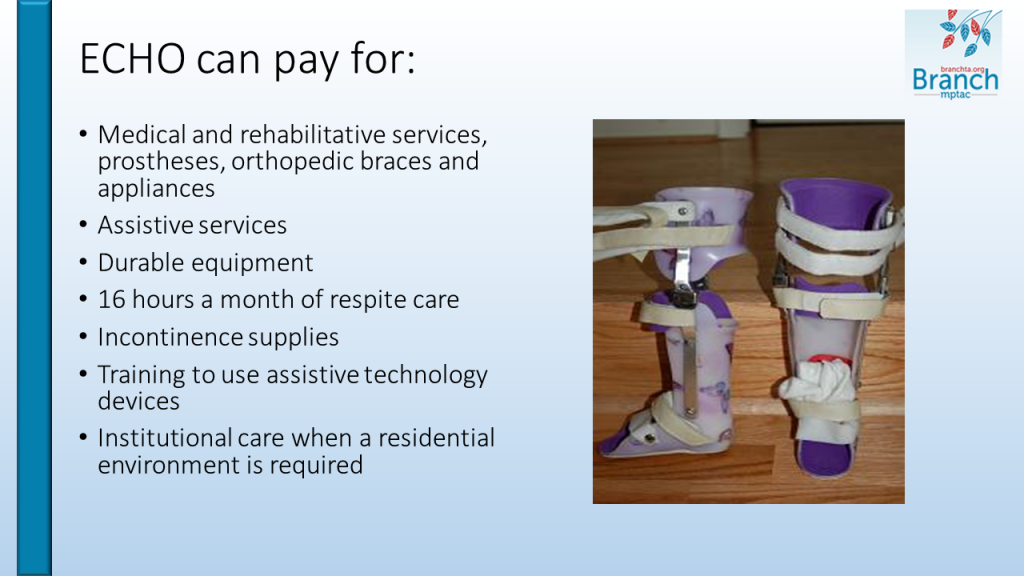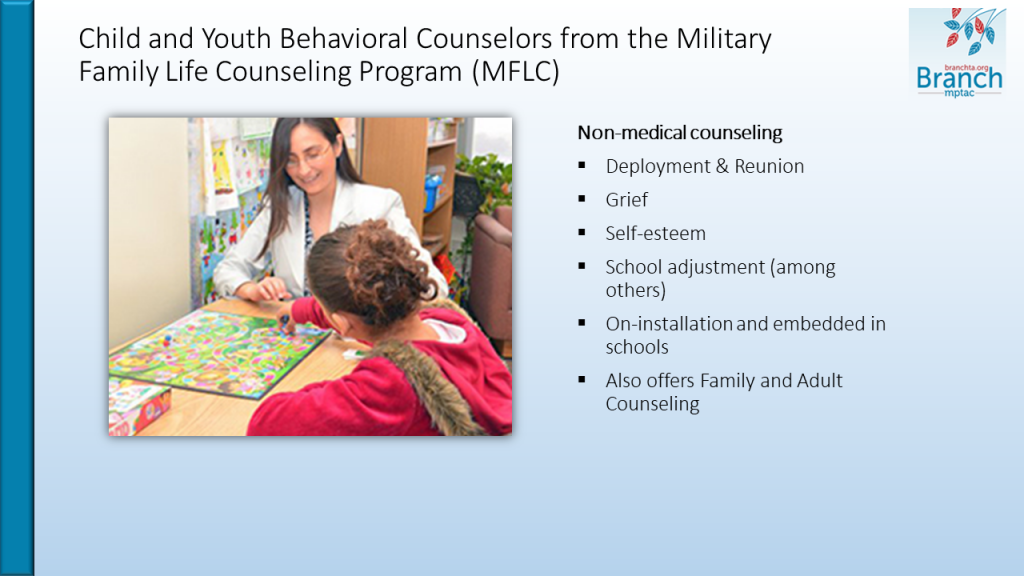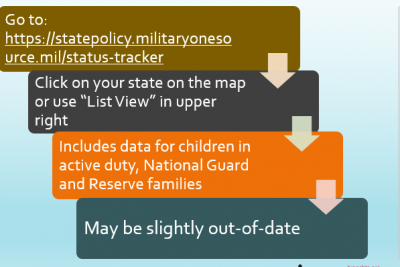Short-and-sweet tutorial on where to get useful data on military families in your state: Active Duty, National Guard, Veterans-plus some creative ideas on using the data. Available with notes pages, which expand a bit on the slides.
Category: Web Page of Information
Leaving the Military: Find Civilian Services for Your Child With a Disability
When your service member separates or retires from the military, where do you go to find civilian services for your child with a disability? Certain military benefits will end and civilian supports and services will need to be put in place. This resource can help you understand which services your child might keep, and what civilian options you can explore.
If you are PCSing to a “forever” home location, this article includes resource finders available across the United States and Territories.
As you read down the columns, you will see references to Parent Centers. Parent Centers are funded by Office of Special Education (OSEP), US Department of Education to support parents of children age birth to 26 who have disabilities.
In addition to the extensive resources at your state’s Parent Center(s), you can also use resources at the Center for Parent Information and Resources (CPIR), a national center serving Parent Centers and families with online information. According to the CPIR:
“There are nearly 100 Parent Training and Information Centers PTIs) and Community Parent Resource Centers (CPRCs) in the US and Territories. These Centers perform a variety of direct services for children and youth with disabilities, families, professionals, and other organizations that support them. Some of the activities include:
- Working with families of infants, toddlers, children, and youth with disabilities, birth to 26
- Helping parents participate effectively in their children’s education and development
- Partnering with professionals and policy makers to improve outcomes for all children with disabilities” – https://www.parentcenterhub.org/the-parent-center-network/“
Quick-find links:
Medicaid Home and Community Based Services (HCBS) Waiver
*Because of military family mobility, including when retiring from the military, retaining a place on a HCBS Waiver wait list may be challenging. Some states have made legislative changes to help military families retain earned priority to receive HCBS Waivers (Military State Policy Source status tracker from Military OneSource). Learn about the military waiver benefit at Military OneSource.
Autism resources by State (Easter Seals)
State Agencies on Developmental or Intellectual Disabilities
Family to Family Health Information Centers –these may be programs in a state’s parent center(s)
Parent2Parent: direct, one-on-one trained support from other parents in your family’s situation, and support groups. Sometimes located in parent centers.
| Children’s Benefits: Active Duty or Active Reserve | Keep Benefit? (retiring after 20 yrs service) | Equivalent Civilian Resources |
|---|---|---|
| TRICARE medical coverage (may include case management, mental health, hospice care | Yes, but there may be extra costs | Private insurance (useful article at the Military Wallet website Medicaid |
| TRICARE for children after age 21, up to age 26 (including college students) | Yes | Private insurance (useful article at the Military Wallet website Medicaid |
| TRICARE after age 26 through secondary dependency | Yes | Medicaid Supplemental Security Income(SSI) -in some states, receiving SSI helps determine Medicaid eligibility |
| ABA services through Tricare’s Autism Demo Project | Yes, but only if the service member retires, as opposed to leaving the military prior to fulfilling the terms of service for retirement. If the service member leaves without retiring, try the resources in the right-hand column. | Medicaid Medicaid Home and Community Based Services (HCBS) Waiver Autism resource by state (Easter Seals) State agencies on Developmental or Intellectual Disabilities |
| Extended Care Health Option (ECHO) provides supplemental support services not available through Tricare’s regular coverage. Some benefits similar to Medicaid HCBS waivers | No | Medicaid Home and Community Based Services (HCBS) Waiver |
| Respite care through ECHO and other programs | No, but check with the community family center at a local installation to identify any military-family support organizations which may offer funding or locator services. | Medicaid Home and Community Based Services (HCBS) Waiver Easter Seals Respite locator: https://archrespite.org/respitelocator |
| Exceptional Family Member Program (EFMP) Family Support (help with navigating military and some civilian systems | Yes, at the discretion of each installation’s EFMP Family Support office | Parent Centers |
| Military child care benefits | No | Private: not subsidized but can use the directory: ChildCareAware.org If a family has income restrictions, many states have subsidized care through Dept. of Health and Human services, or equivalent |
| School Liaison office for help navigating school systems and services. Helps families use MIC3 (Interstate Compact) | Parent Centers | |
| Interstate Compact on Educational Opportunities for Military Children (MIC3) | Children are covered by the provisions of the Compact for one year after service member retires. | Parent Centers |
| Free Tutoring from Tutor.com | No | Commercial tutoring or through school |
Two Nationwide Resources to share with Military Families
University Centers of Excellence in Developmental Disabilities (UCEDDs) and Leadership Education in Neurodevelopmental and Related Disabilities (LEND) programs
Parent centers already refer families to UCEDDs and LEND programs or otherwise have relationships with them, serving on advisory boards and collaborating on partnerships. Here are three reasons for specifically informing military families about these programs and suggestions for outreach:
Continue reading “Two Nationwide Resources to share with Military Families”
4 Reasons for Parent Center Staff to Know 5 Facts About TRICARE
Medicaid waivers, respite care-and IEPS! Learn how the military healthcare system interacts with civilian healthcare and what military parents need to know about TRICARE services and Special Education.
Continue reading “4 Reasons for Parent Center Staff to Know 5 Facts About TRICARE”Helping Military Families Receive Early Intervention Services
Although all parents of children with disabilities need accurate and timely information, parents of children age birth to three have a narrow time frame to get interventions. With so many differences in lead agencies, family copays, and eligibility for EIS state to state, highly mobile military families have a crucial need for information in advance of a move.
Continue reading “Helping Military Families Receive Early Intervention Services”Get Installation Access for Events, Parent Trainings, and Individual Assistance
Who and how to contact for access, processes, and documents needed-check it out!
Continue reading “Get Installation Access for Events, Parent Trainings, and Individual Assistance”Compensatory Education and Relocating Families
On October 23, 2019, OSEP published a letter to “Anonymous” about the provision of compensatory education, as part of a complaint resolution, after a family relocates to a new state. This informal guidance can be useful to highly mobile military families.
Continue reading “Compensatory Education and Relocating Families”E-Learning Modules for Staff Development
These quick modules are perfect for individual staff self-directed learning, on-boarding new staff (see Easy Branch Orientation and Guide to Staff Training for suggested order), or as a webinar for a group. A script is included via the “Notes” page view, supplementing the slide text and images with additional information. We’ve included a link to a quick learning quiz at the end of the module, covering key points. Staff get instant feedback at the end of the quiz; they can review the module and take the quiz as many times as they wish to solidify their learning.
TRICARE-Healthcare for Military Families

By the end of this e-learning module, you’ll have found out why it’s important to know about this military healthcare program and learned how TRICARE benefits may affect or support special education services.
The ECHO Program and ABA for Military Families

This module is a basic introduction to two important military benefits for families you help. You will understand what benefits are available, who is eligible, and the distinction between these benefits and school services under IDEA.
ECHO PROGRAM AND ABA MODULE: CLICK HERE
Mental Health Resources for Military Families

By the end of this e-learning module, you’ll be familiar with mental health resources available for active duty, reserve, and veteran military children and youth. You will earn about programs and apps military parents can use to reduce stressors for military kids and teens. At the end of the module are several slides with links to relevant articles, and military and national organizations that provide mental health services for military-connected families. There is also a link to a printable handout for all the resources.
Family Caregiving at Sesame Street in Communities
image credit-Sesame Workshop
Sesame Workshop has released a new set of resources, Family Caregiving, for military and other families dealing with the “new normal” of caring for an ill or injured family member. Resources are developed from solid evidence-based research.
Continue reading “Family Caregiving at Sesame Street in Communities”National Guard Families-Fresh Ideas and Resources for your work
Good Reasons for Intentional Outreach
- Many National Guard families are new veteran families who were recently on full-time active service and may be new to your community and to non-military services for individuals with disabilities
- Some National Guard are actually full-time military and move from state-to-state for duty
- For many National Guard families, their commitment to the military and its mission is much more than a part-time job. Like active-duty families, they turn mostly to the military for information and support:

